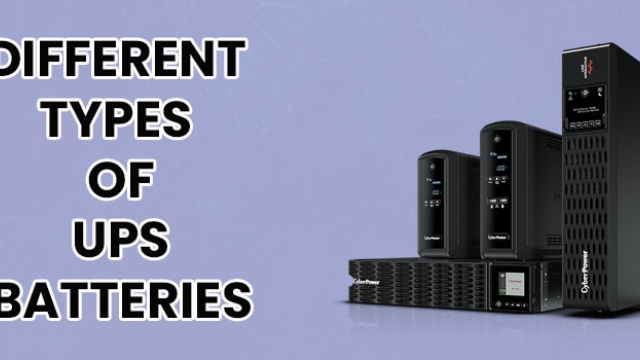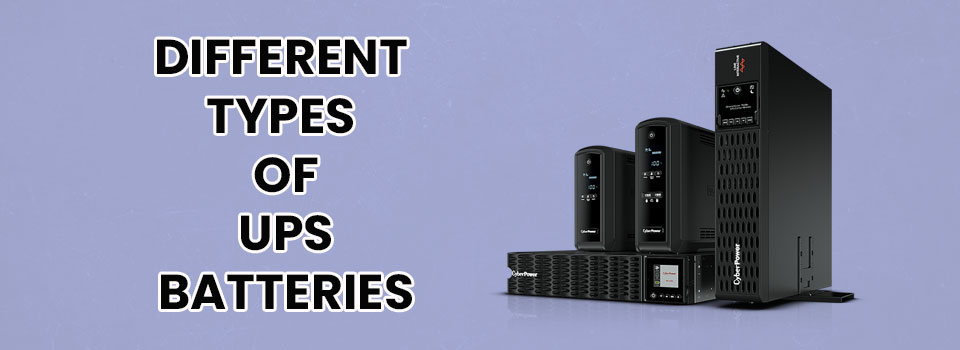
Power Up: The Essential Guide to Choosing the Right UPS Batteries for Uninterrupted Energy

In our increasingly digital world, ensuring that we have a reliable power supply is more important than ever. Uninterruptible Power Supply (UPS) systems play a crucial role in protecting valuable electronics and data during power outages or fluctuations. However, the effectiveness of a UPS largely hinges on one essential component: the batteries. Choosing the right UPS batteries can significantly impact the performance and longevity of your backup power system, making it a decision that should not be taken lightly.
When it comes to selecting the appropriate UPS batteries, there are numerous factors to consider. From understanding the different types of batteries available to evaluating their capacity and longevity, the choices can be overwhelming. This guide aims to provide you with the essential knowledge needed to navigate through these options and help you make an informed decision. Whether you are powering a small home office or managing a large data center, selecting the right UPS batteries is key to ensuring uninterrupted energy and peace of mind.
Understanding UPS Battery Types
UPS Battery
When it comes to uninterruptible power supplies (UPS), understanding the different types of batteries available is crucial for ensuring consistent and reliable power. The most common battery types used in UPS systems are lead-acid, lithium-ion, and nickel-cadmium batteries. Each of these battery types has distinct characteristics that affect their performance, lifespan, and suitability for various applications.
Lead-acid batteries are the traditional choice for UPS systems, known for their cost-effectiveness and widespread availability. They come in two main varieties: sealed lead-acid (SLA) and vented. SLA batteries are maintenance-free and ideal for most settings, while vented batteries can provide higher capacities but require regular maintenance and ventilation. One of the key downsides of lead-acid batteries is their relatively shorter lifespan and sensitivity to temperature variations, which can impact their efficiency.
Lithium-ion batteries have gained popularity in recent years due to their longer lifespan and higher energy density. These batteries can last significantly longer than lead-acid alternatives, often exceeding ten years with proper use. Additionally, lithium-ion batteries charge faster and are lighter, making them easier to integrate into compact UPS systems. However, they tend to come with a higher upfront cost, which can be a consideration for budget-conscious consumers.
Factors to Consider When Choosing UPS Batteries
When selecting UPS batteries, one of the primary factors to consider is the power capacity required for your system. This capacity is usually measured in volt-amperes (VA) and must align with the total load of the devices you intend to protect. Assessing the power consumption of your equipment helps ensure that the UPS can provide sufficient backup during an outage. A battery with inadequate capacity may fail to keep your systems running for the desired duration.
Another critical aspect is the battery chemistry used in the UPS. The most common types include lead-acid and lithium-ion batteries. Lead-acid batteries are typically more affordable and widely available, but they have a shorter lifespan and require more maintenance. In contrast, lithium-ion batteries, although initially more expensive, offer longer life, lower weight, and better energy efficiency. Understanding the pros and cons of each chemistry type helps in making an informed decision based on your needs and budget.
Lastly, consider the runtime and recharge time of the UPS batteries. Different applications may require varying lengths of power backup. It’s essential to evaluate how long you need the UPS to sustain your devices during an outage and how quickly you want the batteries to recharge after use. Longer runtimes and faster recharge times can contribute to a more reliable power supply, especially for critical systems where downtime must be minimized.
Maintenance Tips for Longevity
To ensure the longevity of your UPS batteries, regular maintenance is crucial. This includes periodic inspections to check for any signs of wear or damage. Look for corrosion on terminals, swelling of the battery casing, or leaks. Keeping the terminals clean and free of corrosion can enhance the performance of the batteries and prolong their lifespan.
Another important aspect of maintenance is monitoring the temperature and environment where the UPS batteries are stored. Extreme temperatures can negatively impact battery efficiency and life. Ideally, batteries should be kept in a cool, dry place, away from direct sunlight and humidity. Consistent temperature control can prevent overheating and ensure optimal performance over time.
Lastly, routinely test your UPS batteries to ensure they are functioning correctly. This can be done through self-tests or by using specialized equipment to measure battery health. Keeping a record of the battery’s performance will help you identify trends and issues that need addressing. By staying proactive and attentive, you can significantly extend the life of your UPS batteries and ensure uninterrupted energy supply when you need it most.



